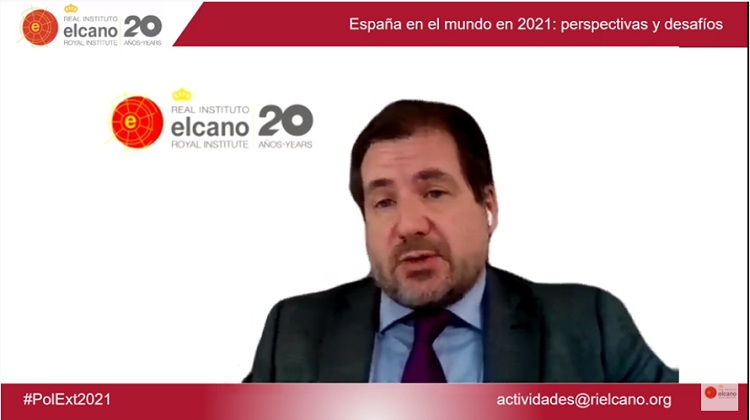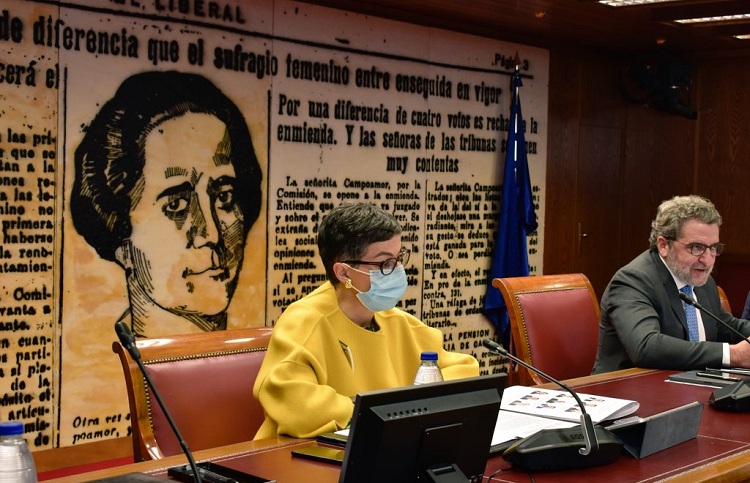Eduardo González
After a 2020 strongly conditioned by the COVID-19 pandemic, which “has not been positive for Spain’s international position or for reducing internal political polarisation”, the start of 2021 has shown that “it is not easy to project oneself abroad with a certain solvency” when, “from within the government itself”, “none other than authoritarian Russia” is given “the reason” in a bilateral incident on “the democratic quality of Spain”.
These are some of the conclusions of the report Spain in the world in 2021: prospects and challenges, presented yesterday online by the Elcano Royal Institute, which analyses, for the ninth year, the main features of the international scenario and the challenges that Spain must face.
“There seems to be little doubt that COVID-19 has not been positive for Spain’s international or European position, nor has it served to lessen the strong internal political polarisation”, said the report’s coordinator, Ignacio Molina, senior researcher at the Elcano Royal Institute, during his speech at the meeting, which was moderated by the recently appointed president of the think tank, José Juan Ruiz.
However, the pandemic, insofar as it concentrated almost all political attention, did have the positive effect of “giving a clear mission to foreign and EU action”, not only “lessening (or postponing) the latent tensions in the coalition government of PSOE and Unidas Podemos”, but even “helping to ensure that the tense domestic agenda does not contaminate foreign policy”, he continued. “It is to be hoped that the high level of confrontation between the government and the opposition on the domestic agenda will not be transferred much to foreign or European policy”, which, except for some “friction” on specific issues (the EU negotiation of the recovery plan, Venezuela, Western Sahara, the external dimension of the Catalan conflict and Gibraltar), continues to be characterised by “a solid underlying agreement” in favour of Europeanism, multilateralism and Atlanticism, the researcher added.
In any case, according to the report, “the start of 2021 has shown that it is not easy to project oneself abroad with a certain degree of solvency or to manage a smooth diplomacy when, from within the government itself, the junior partner agrees with none other than authoritarian Russia in an incident between the foreign ministers of the two countries over Spain’s democratic quality”.
“It is true that, except for the not very well-defined assignment of Agenda 2030 issues to the second vice-president, Pablo Iglesias, almost all the departments with a relevant foreign dimension are in the hands of the Socialists“, but “it has already been demonstrated that this distribution of portfolios will not always serve as a firewall so that internal political debates, some of which are certainly colourful, do not affect foreign and European policy too much“, warns the document.
As for the government’s internal polemics on the quality of Spanish democracy, according to Ignacio Molina, “international experts give Spain a high mark and systematically place it among the fifteen to twenty most democratic countries in the world”. Therefore, although Iglesias’ statements on Spanish democracy must have “caught the attention of the political counsellors of the Embassies”, on a “macro level, the image of Spanish democracy is good”, continued Ignacio Molina. On the other hand, he warned, “when we ask Spaniards the same question, they are very critical; there is a huge gap between how the quality of Spanish democracy is judged abroad and how Spaniards perceive it“. “The truth is that if Spaniards themselves think that democracy can be improved, this also affects the quality of Spanish democracy”, he admitted.
The External Action Strategy
The report also highlights the importance of the government’s new Foreign Action Strategy, which “places Spain among those seeking inclusive responses” to global problems, “adopting a pro-European and multilateral vocation based on the values that define Spanish society and which, abroad, make it possible to exploit Spain’s character as a nodal and structuring country”. Apart from this, the Strategy “mentions some interesting developments, ” such as the modernisation of the foreign service through the improvement of its human and material resources and its digitalisation, the significant increase in funds for cooperation, the introduction of mechanisms that facilitate the integration and coordinated action of all administrations, and the capitalisation of the “broad Spanish ecosystem abroad” in diplomatic action.
“It remains to be seen whether this document transcends a mere intellectual exercise or whether it has a practical translation as of this year”, but “as long as we do not overcome the current internal, economic, social and political crisis, Spain’s international position will continue to be much weaker than its potential”, warned Ignacio Molina.






